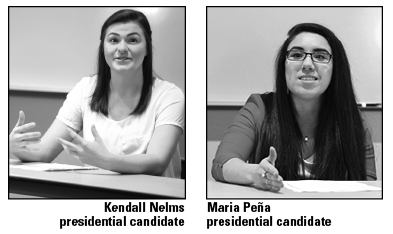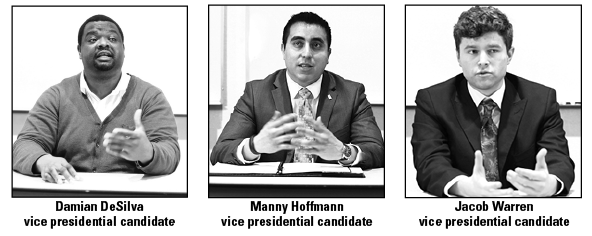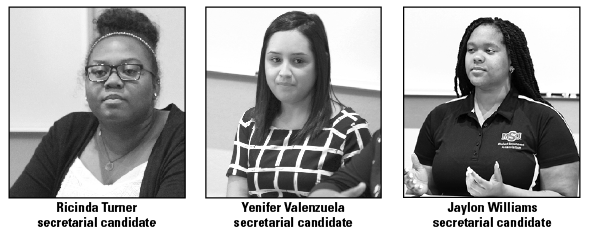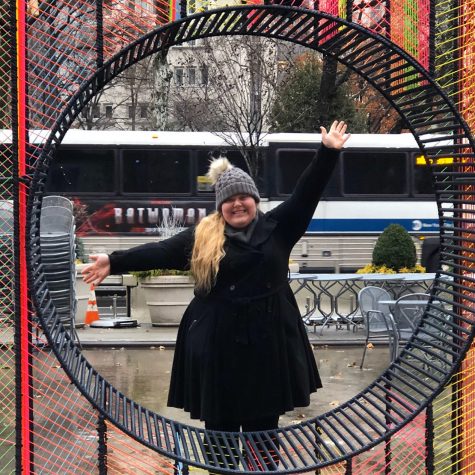The attendance for the final debate nearly doubled to about 85 students, as well as increased online views to 800 views on the MSU Facebook page along with about 240 views from the Wichitan Periscope live stream from last week.
Presidential candidates
Presidential candidates Kendall Nelms, psychology sophomore, and Maria Peña, political science junior, addressed audience questions on campus inclusion and focused on service as the necessary response.
“Our student government is supposed to create different forums and different types of events for students to actually participate in,” Peña said. “We could do a better job having and promoting events weekly or bi-monthly to represent the students and show them that our student government is there for them.”
The opposing stances between Nelms with “new and inventive” ideas and established three-year SGA member, Peña, outlined the differences each candidate offers to the student body.
Although Nelms is only a sophomore, she and Peña both agree that age is no deterrent for progress or campus advancements because involvement is crucial for presidents.
“Along with my involvement with my sorority, Chi Omega, I also get involved in activities outside of campus,” Nelms said. “I know how to get my voice out there and heard in the community, and I want to help other students with that.”
While age is not a restriction, Peña said experience is necessary for presidential candidates to succeed in office.
“Although she [Nelms] does lack experience, I feel like she could do a good job as well, but one of the things that gives me the benefit of this is the experiences in leadership position I currently hold,” Peña said. “I have put myself in the position where I want to listen to everybody and see what I can do to benefit everyone at the university.”
Once asked for audience input, SGA senator Luke Allen, political science and Spanish junior, brought up the topic of inclusion and said while separation can easily creep into organizations without acknowledgment, SGA works hard to eliminate the unintentional isolation.
“I see a lot of entities that want to do their own thing, and SGA kind of brings them together, but there is still the separation,” he said. “That’s not with every case, but in order to get things moving and done, we need to get all these organizations together. With such a diverse student body, I think that’s a big issue I hadn’t really heard discussed and that’s why I wanted to bring it up. It’s more important for a leader to show their plans and exhibit what they are speaking about rather than just discuss it.”
Vice presidential candidates
The vice presidental candidates are Jacob Warren, economics junior, Damian DeSilva, economics senior, and Manny Hoffmann, political science junior also discussed this platform.
According to Hoffmann, he was unsure of the direction he wanted to take which led him to register late for candidacy, but now feels “there is a lot to accomplish.”
“I’ve been fortunate enough to serve as the secretary this past year and it’s encouraging because the relationship between administration and student government is strong,” Hoffmann said. “They really listen to what we have to say and a lot of progress does come out of that. I want SGA to be given the esteem it warrants, so it shows that we are there to get work done.”
With the goal to further strengthen relationships, DeSilva said he continues to push to serve as a connection for students and wants to bridge the gap between faculty and students.
“Even though SGA does a good job with activities, there is a disconnect between what is relevant to the students and how it affects them,” DeSilva said. “There needs to be more effort put into promoting student involvement in SGA, so we need to work on how to reach out to get input from the general student body.”
According to Warren, his goal for vice presidency would be to serve the student body and focus on the issues they want to see change. His ideas range from online polls to physical presence to convey his efforts to ensure committee progress.
“As vice president, I would have each committee pick a goal and have them accomplish it by the end of the month,” he said. “If we hold the committees accountable to having one event a week, we increase SGA’s presence on campus and that allows students to get involved. Most organizations don’t know that we can team up with them to help.”
Secretarial candidates
While neither Yenifer Valenzuela, finance junior, nor mass communication junior Patrick German were not present at the final debate, Ricinda Turner, mass communication junior, and Jaylon Williams, sociology senior, each explained the vitality of communication from the secretary as well as from the organization as a whole. German, backed out of the election for secretary, but remains on the ballot.
“Many people don’t get messages about what is going on on campus, but there is always room to grow,” Turner said. “With that, you find ways to communicate to students beyond their email whether that’s through portal, phone number or any organizations they might be a part of. We have to reach them in an effective way.”
While communication between committees and organizations on campus is effective, Williams said the external factor of students off campus poses one of the greatest challenge for SGA and that is where her attention is focused.
“Involvement is one of the biggest concerns for incoming students because they don’t get involved,” Williams said. “As those in executive positions, we can lead by example and that is what I’m hoping for, that we can get SGA’s name out there, get our face out there and invite students to get involved with SGA, so we can truly support the students and help them decide where to get involved and to want to stay.”
Voting opened on the MSU portal Feb. 28 and will run through March 3 at 5 p.m.















